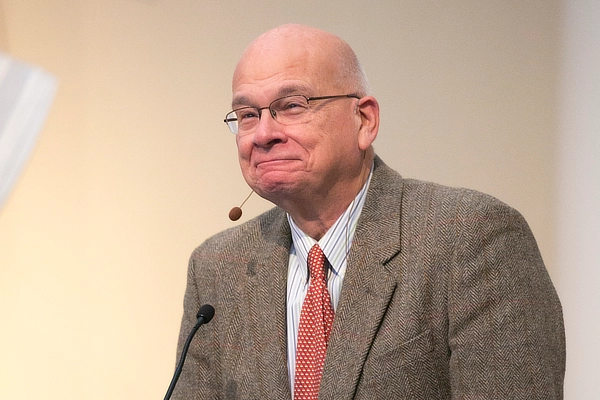
No modern theologian has been more influential in my personal faith and ministry development than Tim Keller.
After my freshman year of college at Samford, I read The Reason for God at a critical juncture in my spiritual growth. During my senior year, I worked my way through Center Church during my free time. (I distinctly remember reading through chapters while on breaks at Step Sing rehearsals!) While serving overseas after graduation, I used several of his books in the classroom and in chapel presentations. His writings helped me understand my calling to ministry and the need to attend seminary.
In the spring of 2016, I was preparing to move back to Birmingham, Alabama, to enroll at Beeson Divinity School. When the school announced that Keller would preach in one of Beeson’s community worship services and give a public lecture on faith and work that November, I was elated. I was going to get to hear one of my “heroes of the faith” speak in person!
When the Manhattan pastor came to Birmingham, I was almost done with my first semester in seminary. At the time, I was weary from an intense semester of studying and, frankly, questioning whether seminary was where I needed to be. I arrived early to chapel and found a seat. As usual, we sang, heard the reading of Scripture, and prayed together. Then, Dr. Keller began to preach. The sermon began with a couple of formalities, then immediately got negative.
“I’m on the verge of having been in the ordained ministry for forty-two years,” Keller began.
“And those of us who have been in the ordained ministry for that long know how many people who started with us didn’t get to the finish line. It’s a grievous percentage. It’s a lot of people. And I think one of the main reasons why so many people fall by the wayside over the years is because they aren’t warned. That’s why I’m going negative.”
He proceeded to preach on 2 Corinthians 12:7-10 and the temptations ministers face, including the conceit of theological knowledge, ministry as a false identity, and focusing on the outer life instead of the inner life.
The sermon was no glamorous description of ministry. If anything, it was a warning to those pursuing vocational ministry. Nonetheless, it was exactly what I needed to hear. As was the case with many of his prophetic teachings, the sermon convicted me.
At that moment, I needed to be reminded that my identity was not in how much theological knowledge I had gained (or would gain) or how well I outlined my essays or preached sermons. I needed to be reminded that the difficulties I was facing—and the difficulties I would face in years ahead—would prepare me for greater faithfulness. I needed that reminder then, and I still need it today. In fact, I believe all seminary students and aspiring ministers need to hear it.
In my current role at Beeson, I have the privilege of talking with prospective students about their faith in Jesus Christ and their sense of calling to ministry. I have lost count of the students whose stories contain a chapter that goes something like this:
“I reached a faith crisis in college, but I stumbled upon Tim Keller’s books, which helped me tremendously.”
Or “After I became a Christian, I listened to Keller’s sermons almost daily.”
When I hear these anecdotes, I am reminded that Keller’s influence on people in my generation, and the generations before and behind me, has been seismic. I also gain an even deeper appreciation for the ways in which God has used this pastor-theologian to lead men and women closer to Jesus Christ.
Oftentimes, the students who share their stories with me end up enrolling as a student at Beeson. That process usually involves asking many questions, but I think the best ones are, “How do I go through seminary well” and “How do I avoid letting theological knowledge puff me up?” I usually respond by commending them for asking these questions in the first place, as awareness of the temptations is key. But I think my new response will be, “There’s a sermon you need to hear.”
Although I never met Dr. Keller in person, the news of his recent death has stung. I will miss his prophetic voice and his winsomeness. I will miss his witness, both in word and deed. I grieve, alongside the tens of thousands of others he discipled, many of whom I meet throughout the admission process at Beeson. Nonetheless, we do not grieve without hope.
In the center of the dome in Hodges Chapel, where Keller preached in 2016, is an image of Jesus reaching out his nail-scarred hands. Behind and around Jesus are images of peoples’ faces, some identifiable and others not, of the “great cloud of witnesses” (Heb. 12:1).
I rejoice knowing that the pastor who has been the most integral to my faith and ministry development rests with that cloud of witnesses. As I continue talking with future ministers considering studying at Beeson, I believe my gratitude for Tim Keller will grow even deeper. And as I continue worshipping in Hodges Chapel and reflecting on the cloud of witnesses in the dome, I believe I will think of the life and ministry of Tim Keller. I, for one, find the race of the Christian life a little easier to run because of it.
Watch Tim Keller’s sermon at Beeson Divinity School, “The Temptation of Ministry,” on our YouTube channel.